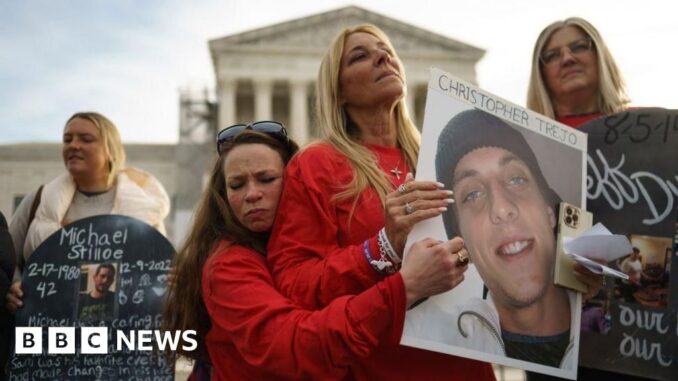
The US Supreme Court has struck down a part of the bankruptcy deal for Purdue Pharma that would have shielded members of the Sackler family from future lawsuits over their role in fuelling the opioid crisis.
The Sacklers, who owned and operated the Oxycontin-maker for decades, had agreed to pay $6bn (£4.7bn) toward a wider settlement in exchange for sweeping protections against civil claims related to the addictive opioid.
But the nation’s top court ruled that granting such protections to those who did not themselves declare bankruptcy was not authorised under bankruptcy law.
It is a victory for the US government, which had challenged the deal, arguing that releasing the Sacklers was a misuse of the system.
But it raises major questions about the future of the settlement, which had won significant, if mixed, support from many who sued the company and saw it as the only practical way to reach the family’s billions for drug treatment and other uses.
Purdue became a household name in the US as the maker and promoter of OxyContin – a prescription painkiller it promoted as safe, despite being aware it was both highly addictive and widely abused.
The company declared bankruptcy in 2019, after it was hit by thousands of lawsuits brought by states, cities and families. It later pleaded guilty to criminal charges, including defrauding health agencies and making illegal payments to doctors.
The kind of shield granted to the Sacklers in this deal has been a critical feature of other high-profile settlements, including those involving Boy Scouts of America and the Catholic Church.
But courts have been divided as to whether such “releases” from liability for third parties like the Sacklers, who did not themselves declare bankruptcy, are actually permitted.
In asking the Supreme Court to take up the issue, lawyers for the US government said letting it stand “would leave in place a roadmap for wealthy corporations and individuals to misuse the bankruptcy system” and escape accountability.
In the 5-4 opinion, Justice Neil Gorsuch echoed those concerns.
“The Sacklers have not agreed to place anything approaching their full assets on the table for opioid victims, ” he wrote. “Yet they seek a judicial order that would extinguish virtually all claims against them for fraud, willful injury, and even wrongful death, all without the consent of those who have brought and seek to bring such claims.”
The court noted that the Sacklers “seek to pay less than the code ordinarily requires and receive more than it normally permits”.
Oxycontin, often an entryway into harder drugs, such as heroin, has been blamed for driving the opioid crisis.
Since 1999, a few years after the drug became available, deaths from opioid overdoses have surged eightfold to more than 80,000 annually.
Court filings allege the Sackler family was long aware of the legal risks, and withdrew some $11bn from the company in the decade before its bankruptcy. They stashed much of the money overseas, making recovery difficult.
When the Supreme Court heard arguments last year, dozens of protesters opposing the deal showed up, holding signs such as “my dead son does not release the Sacklers”.
But many others have backed the deal, willing to accept the terms if the result was billions of dollars for treatment, as well as $750m that would go directly to opioid victims, estimated at $3,500-$48,000 each.
Purdue said Thursday’s decision was “heart crushing” and that it would immediately reach back out to restart negotiations.
“Critically the ruling is limited to the narrow legal issue regarding the scope of the third-party releases,” the company said in a statement. “The decision does nothing to deter us from the twin goals of using settlement dollars for opioid abatement and turning the company into an engine for good.”
The ruling does leave open the possibility to restart negotiations.
“It’s going to be a complete nightmare,” said Cheryl Juaire, the mother of two sons who died of opioid overdoses, who helped negotiate the deal as a member of the creditors’ committee.
“There’s no win-win here. If the Sacklers go to jail, that would be justice for a lot of people but it wouldn’t save lives.”
Abbe Gluck, a professor at Yale Law School, said the justices were under a “lot of pressure not to stop this money from flowing to victims”.
But she said the case served as a “test case” for wider legal issues, as more firms look to bankruptcy courts – which have unusual power to centralise lawsuits and compel settlement- to resolve claims of mass wrongs.
She said the decision was a warning against that trend.
“The court is sending a signal of caution I think that should have an impact on other pending cases,” she said.


Be the first to comment